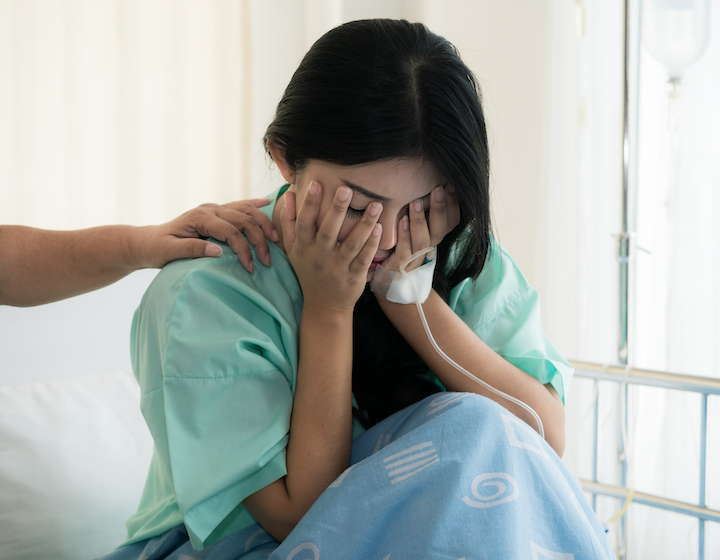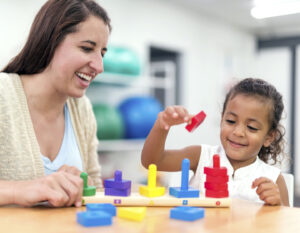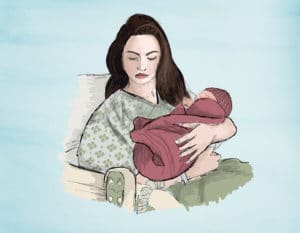




In honour of Pregnancy Loss Awareness Month, Kate Fahey sheds light on this painfully common (but rarely discussed) experience.
Pregnancy loss is not easy to talk about. But the chances are you, or someone very close to you, has experienced it sometime. An estimated one in four families is affected by the loss of their children in pregnancy, at birth and in infancy.
October is Pregnancy Loss Awareness Month – an initiative launched in 1988 by then-US President Ronald Reagan to promote greater awareness, remembrance and support of those who have suffered losses and, in doing so, to help them heal. Now, over 30 years later, governments, health organisations and NGOs from countries all over the world use this month to draw attention to this experience.
Read More: Know Your Body – Learn How To Correctly Perform A Breast Self-Exam


What Is A Loss Of Pregnancy?
Miscarriage
By far, the most frequent type of pregnancy loss is a miscarriage (pregnancy loss in the first 23 weeks of gestation). Most miscarriages happen in the first few weeks. Around 85% of losses occur before week 12 (which is why some people prefer to “keep mum” until the first trimester is over), though a recent study showed that once a pregnancy gets past 6 to 7 weeks and has a heartbeat, the risk of having a miscarriage drops to around 10%.
Second-trimester miscarriages, between 12 and 23 weeks, are far less common, accounting for less than 5% of all pregnancy losses. Miscarriages can be “spontaneous” – the mother can experience loss of pregnancy symptoms, abdominal pain and cramping, and vaginal bleeding before miscarrying. Others may be “missed” – the mother has no symptoms at all and the loss is only detected at a later scan.
Ectopic And Molar Pregnancy
Other forms of early pregnancy loss are ectopic and molar pregnancies. An ectopic pregnancy is a potentially life-threatening condition where an embryo develops outside the womb and a molar pregnancy is one where a non-viable fertilised egg implants in the uterus but cannot come to term. Stillbirths, possibly the most traumatic of all pregnancy losses, occur after 23 weeks gestation but before birth or during delivery. Stillbirths happen in one in every 200 births according to the latest NHS figures.


The Big Question – Why Has This Happened?
With later pregnancy losses, pathology tests may offer some answers. With earlier pregnancy losses, the frustrating answer is that in many cases they will never know. Most miscarriages are put down to “chromosomal abnormalities” with the embryo and your body doing its job and recognising (and terminating) an unviable pregnancy.
Lifestyle and age factors can also play a part. A woman of 30 has a 20% chance of miscarriage, but that goes up to a 50% risk by the time the woman is 42. This is because as you age, the quality of your eggs diminishes. Other underlying health problems, such as diabetes or obesity can play a part, as can too much caffeine, heavy drinking, smoking and using recreational drugs.
Read More: Stress – Causes And Effects On Your Health And How To Fix It


What Can I Do To Stop This From Happening Again?
The answer here, unfortunately, is relatively little. You can make lifestyle adjustments to give your pregnancy the best shot – so eat your veggies, make sure you are exercising and cut out smoking and drinking alcohol.
But, because early miscarriage is so common, medical advice is normally to investigate other underlying causes only after a woman experiences recurrent miscarriages, defined as three or more consecutive miscarriages. At this point, they may do further checks on your thyroid, hormone levels, uterine lining etc. Some of these are treatable and it is important to talk to your OB-GYN or family doctor to understand more about your options here. The UK-based charity Tommy’s is doing excellent work in studying the causes of miscarriage. Read more and watch its video on the topic here.
Read More: Women’s Health – All You Need To Know About Endometriosis


Dealing With The Stages Of Grief After Pregnancy Loss
Early miscarriages can resolve themselves or, once detected, will be medically managed by doctors with the help of drugs or a D&C procedure to remove the foetus from the uterus. Ectopic and molar pregnancies are much more dangerous to the mother and will require medical intervention (most likely surgery) with close monitoring. Late-term miscarriages and stillbirths may require the mother to go through the incredibly difficult process of delivery.
Regardless of the type of pregnancy loss, the parents (men shouldn’t be forgotten in this process) will feel the same stages of grief: denial, anger, bargaining, depression and acceptance. What exacerbates the pregnancy loss is the stigma that exists around talking about it.
I have firsthand experience of this, having gone through two miscarriages and an ectopic pregnancy in the last 12 months. For me, the most difficult thing was the huge sense of isolation I felt after my first miscarriage (where we decided not to tell anyone). I spent a lot of time alone, in my own head, which only really made the whole cycle worse.
With my ectopic pregnancy, I was hospitalised and then recuperating, so we had no choice but to tell some people. And when we did, although the process was much more traumatic for me, being open and transparent helped tremendously. Those we told shared their own stories of loss and recovery. So, when I had my most recent miscarriage, I decided I would again be open about it.
Until we begin to talk about this more openly, it’s hard for people to know what to say. We must share our experiences of pregnancy loss, not only to heal but also to help inform those who can help us through it.
Read More: 5 Tips For Birth Partners – How You Can Help During Labour


Coping With Pregnancy Loss
Any pregnancy loss is a real loss, and you will experience real grief. Eat well, rest a lot, get some exercise and spend time doing things you like with the people you love. Give it time. Nothing will replace the loss experienced, but time does help. Acknowledging the loss is important. That could be crying it out with a partner or a friend, lighting a candle, planting a tree or bush, having a private “ceremony”, taking time to pray or meditate on the loss. Whatever it takes to overcome that first stage of disbelief is important.
It is crucial that women do not blame themselves for a loss. Many of the women I spoke to said they battled with feelings of guilt and shame, especially over their bodies which had “let them down”. If you have a friend going through this, please try to reiterate that this is not their fault.
Equally important is talking to your partner. A recent British study found that although men display less “active grief” than their partners, they were more vulnerable to feelings of despair in the eight weeks following a loss. Spend time being close to your partner and talking about what has happened. If you are going to “hole up” for a bit, do it with him and try to find comfort in each other.
Read More: Where To Find Counselling Psychologists And Therapists In Hong Kong


Where To Go For Help And Support After Pregnancy Loss
Getting the right sort of support is vital, but not always easy in Hong Kong, where stigma around pregnancy loss prevails.
First and foremost, make sure you have a doctor you can trust and feel comfortable with. Some find online forums and discussion groups a lifeline when coping with a loss. The Miscarriage Association website provides a Stars of Remembrance service where women can write messages to their lost babies or simply mark their presence with a lovely star in the sky. There are international chat forums – like Netmums, Mumsnet – and, closer to home, private Facebook group Hope Hong Kong for those struggling with fertility and loss.
The Family Planning Association of Hong Kong also offers online counselling for general fertility and pregnancy concerns. If you want to seek individual help to guide you through the difficult experience of losing a pregnancy, therapy with a trained psychologist or therapist may be very beneficial.
There are ways you can also reach out to get additional support in person. Ask your doctor for a referral to a counsellor; talking to a professional can help. Dr Lucy Lord of Central Health – a long-time advocate for women’s health – is one of the founders and co-chairs of Mind HK, a mental health charity lobbying for greater care for perinatal mental health support. The Assisted Reproductive Unit at the Prince of Wales Hospital has one of the only clinics looking at recurrent miscarriages in Hong Kong.
It is tough to understand, explain and experience a loss of pregnancy. Do take your time to grieve and accept this difficult life experience and reach out and get help from family, friends and committed professionals in Hong Kong.
Read More: Where To Volunteer In Hong Kong – 20 NGOs And Charity Organisations
Editor’s Note: “How To Understand And Cope With Pregnancy Loss” was most recently updated in October 2023.
 View All
View All











 View All
View All





 View All
View All


 View All
View All














